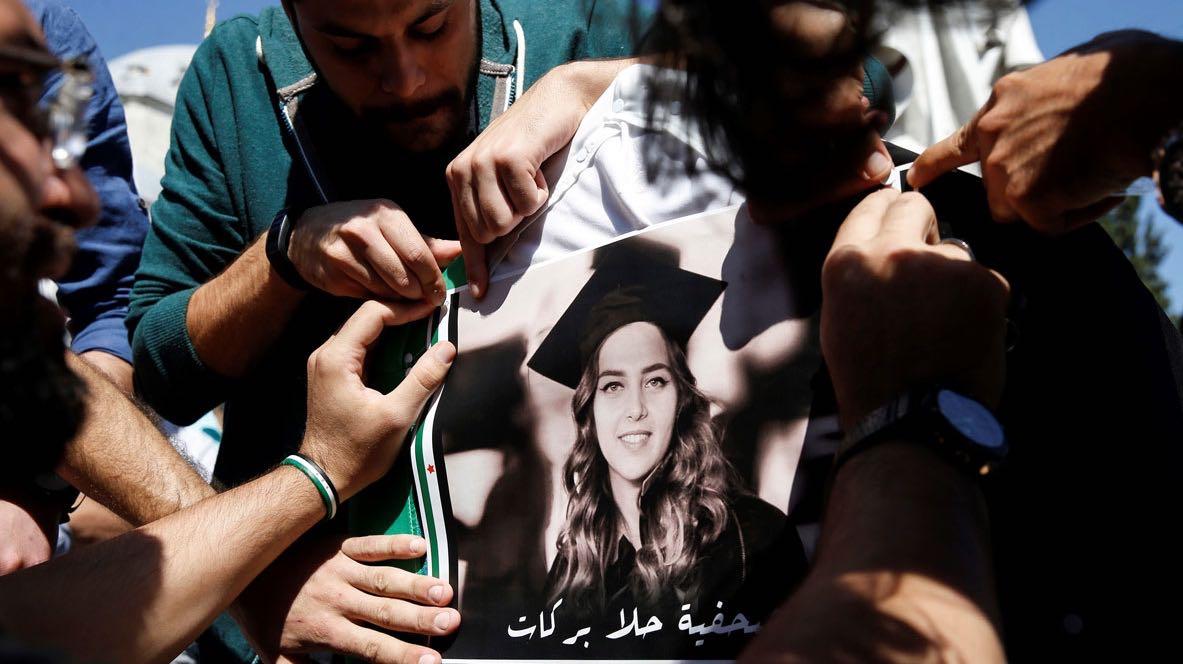An American journalist was murdered in Turkey. Why didn’t the US investigate?
This story was produced by Reveal from The Center for Investigative Reporting, a nonprofit news organization. Get their investigations emailed to you directly by signing up at revealnews.org/newsletter.
Halla Barakat and her mother, Orouba Barakat, devoted their lives to dangerous work. Halla, 23, was a reporter working for two news outlets in Turkey, where she covered the civil war in Syria that had forced millions of refugees to flee across the border. Orouba, 62, was a journalist-turned-activist, a fierce critic of ISIS and of Syrian President Bashar al-Assad and an active member of the Istanbul-based opposition to his regime.
Halla’s star was rising. She recently had worked on a human rights investigation for ABC News. Orouba, meanwhile, was already well known as a regularly fiery guest on Arab television, commenting on the latest news from her native Syria, often with unrestrained passion.
“[The Arab world] knows that this regime is a criminal regime,” Orouba told Al Arabiya in 2012. “Bashar al-Assad said, ‘My father taught Syrians a lesson for 30 years … and I will do the same for a hundred years.’ And I will respond to him: ‘Screw you!’ ”
When the Barakats were killed in September 2017 in a brutal double murder in Istanbul that sparked headlines around the world, their family, friends and colleagues suspected that their work may have threatened powerful figures with the motive and means to silence them.
Their throats cut. Their bodies covered with blankets. Their blood-spattered apartment doused in laundry detergent, a way to hide the smell of decomposition and delay the discovery of the bodies. And no one in their quiet residential neighborhood reported hearing the sounds of a struggle. The scene, to many observers, suggested the work of a professional. Halla was an American citizen — born while Orouba was visiting relatives in North Carolina — who had worked for a US media outlet. So two US lawmakers from the state, Sen. Thom Tillis and Rep. David Price, soon called for a thorough investigation of that very possibility. H.R. McMaster, then a senior member of the Trump administration, even invited a member of the family, Suzanne Barakat, to the White House, where, she said, intelligence officials and diplomats assured her that the case was a priority.
By then, Turkish authorities had arrested and secured a confession from a distant relative named Ahmed Barakat, who had been working for Orouba since arriving in Turkey from Syria six months earlier. Orouba owed him money, Ahmed told prosecutors in the presence of a judge, according to court documents, and when he confronted her in the apartment she shared with her daughter, she refused to pay and attacked him with a kitchen knife, which he then used to kill her. When Halla screamed, he said, he killed her, too.
After a brief trial, Ahmed was convicted and given two life sentences. The case, as far as prosecutors were concerned, was closed, another so-called femicide in a country that has experienced a troubling rise in violence against women.
But questions about the case lingered, especially after the murder of The Washington Post columnist Jamal Khashoggi in Turkey the following year. How could a small debt motivate a man to commit a double murder? Did the Turkish National Police investigate whether the suspected killer acted alone? And why did the FBI, the agency responsible for investigating the killings of Americans abroad, decline to pursue the case?
Suspicious social media activity only fueled more doubts. Within days of the murders, Orouba’s Twitter account appeared to have been hacked. Her tweets were deleted and profile and banner images replaced by a picture of Assad in sunglasses, accompanied by a cryptic but harrowing message: “The Golden Condor / Hacked with greetings / The Golden Condor / Assad’s soldiers are everywhere.”
Suzanne Barakat, a US citizen who lives in the San Francisco Bay Area, was angered by the Trump administration’s apparent indifference.
“An American journalist was murdered. Her throat was slit along with her mother’s in her apartment in Istanbul. And no one gave a damn,” she told ABC News and Reveal from The Center for Investigative Reporting. “Not a word. No one following up with the families to see how they can be of support. No outrage from within the American government.”
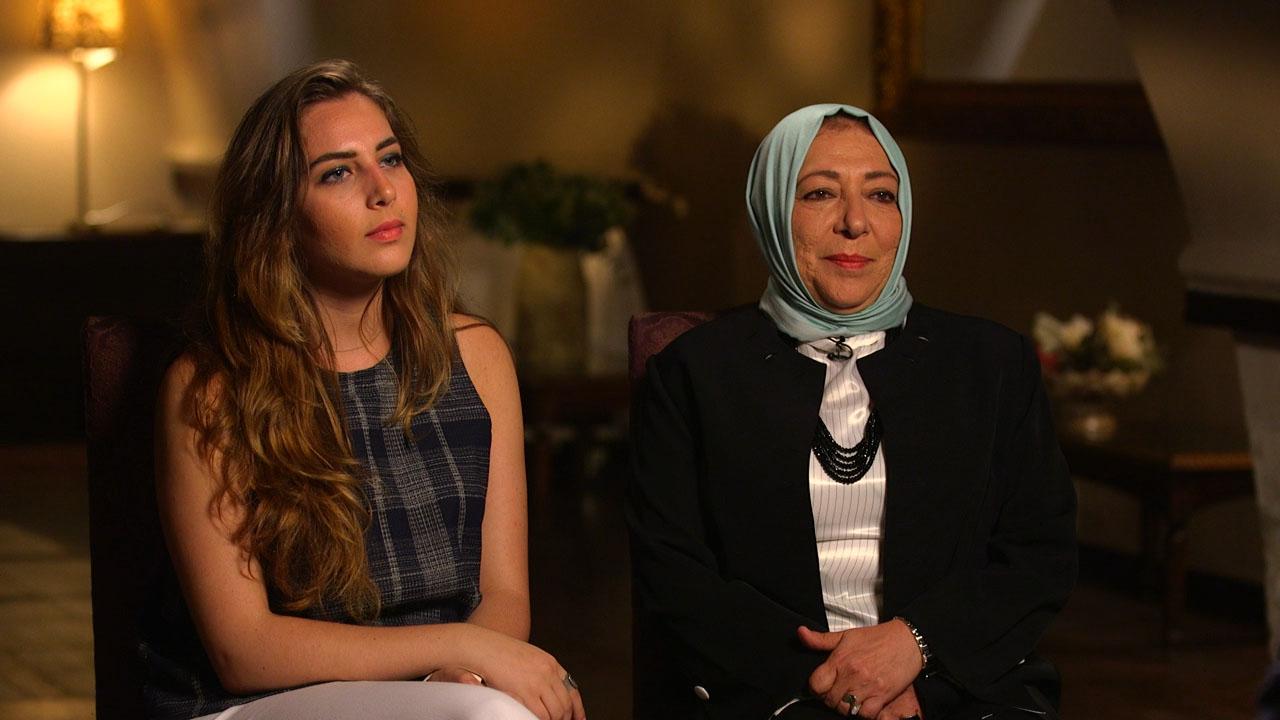
In the three years since their deaths, a trans-Atlantic team of journalists — some based in Turkey, others in the United States, some of whom knew Halla and Orouba personally, others who did not — has been seeking answers to those questions on the Barakats’ behalf. That reporting, led by ABC News, where Halla briefly worked in the months before her death, and Reveal, will be featured in a special edition of “Nightline” and an episode of the Reveal podcast.
ABC News and Reveal obtained hundreds of pages of documents from the investigation led by the Turkish National Police — including police statements, autopsy reports, witness testimony, evidence inventories and court transcripts. Coupled with more than a dozen interviews with family members, friends, colleagues, government officials and outside experts familiar with the case, the documents reveal several inconsistencies and outright contradictions in the official narrative. And records obtained through the Freedom of Information Act, filed by Reveal, show that despite assurances from officials in the White House National Security Council and US Department of State to the contrary, the FBI never opened a case.
Some family members and colleagues have suggested that Orouba had been pursuing a sensitive investigation into Assad regime abuses at the time of her murder. Orouba’s sister Shaza said Orouba had been gathering information about Syria’s now-infamous Sednaya prison, where the United States has accused Assad’s government of building a crematorium to hide evidence of mass killings. Orouba told an ABC News producer in Istanbul that she was “working on something” and “this time, it will be big,” though ABC News and Reveal were unable to find documents or other evidence to corroborate the claim that she had a high-profile investigation in the works.
The Assad regime has been accused of targeting journalists for assassination, and Orouba had, according to police reports, received anonymous death threats in the weeks before the killings. Orouba had publicly feuded with members of the opposition, and she resigned from her position in the Syrian National Coalition, citing corruption within its leadership, in August, just a month before her death.
Abdel Majid Barakat, a former Syrian intelligence officer who later joined the Syrian National Coalition, said that while he had no special knowledge about Orouba’s murder, the Assad administration views journalists as a top national security threat and routinely monitors opposition figures in other countries.
“The regime tries to target people inside these opposition areas,” Barakat, who is not related to Halla or Orouba, told ABC News and Reveal.
The Syrian government has denied allegations that it has targeted journalists, but a US court imposed a $300 million judgment against Syria in 2019 for the death of war correspondent Marie Colvin, in a case that depended in part on documents and testimony provided by Barakat, the former intelligence officer.
Ahmed Barakat recanted his confession to Halla and Orouba’s murders in his very next court appearance, according to court documents — accusing his court-appointed translator of coercing him to cooperate with prosecutors in exchange for leniency — and appealed his conviction. That appeal is pending. In response to questions from ABC News and Reveal submitted through an attorney in January 2020, Ahmed again denied playing any role in the killings. Turkish authorities did not respond to multiple requests for comment on the case made directly to the police and prosecutors and submitted through the Turkish Interior Ministry in Ankara and the Turkish Embassy in Washington.
The FBI, meanwhile, declined to answer specific questions about the case or the bureau’s handling of it, issuing only a brief statement expressing support for the Turkish investigation.
“Upon review into the deaths of Halla and Orouba Barakat, the FBI is confident that the Turkish legal system and their law enforcement conducted a thorough investigation and identified, interviewed and received a confession from the subject,” said Tina Jagerson, an FBI spokesperson. “The FBI is not in receipt of any further relevant information that would dispute the investigative findings or legal outcome. Additionally, the FBI has recently been in contact with the victim’s family and has communicated the FBI’s decision.”
The Committee to Protect Journalists, which tracks violence against journalists around the world, has yet to make an official determination on whether Halla’s death was work-related.
“We are skeptical about the confession of a distant male relative of the two women who said he killed them over money,” said Joel Simon, the committee’s executive director. “Authorities should consider Orouba Barakat’s activism and Halla Barakat’s journalism as possible motives.”
That question, like so many others, appears to have been set aside with Ahmed’s confession.
And Rep. David Price, who represents the Raleigh district where Halla was born, said the FBI and Trump administration should have done more.
“There were reasons to expect that this might be more than just a robbery or just a routine homicide,” Price told ABC News and Reveal. “The motivation and the scale of the crime didn’t fit the scene. … It doesn’t add up.”
“This is the administration,” he said, “failing to pursue an important case.”
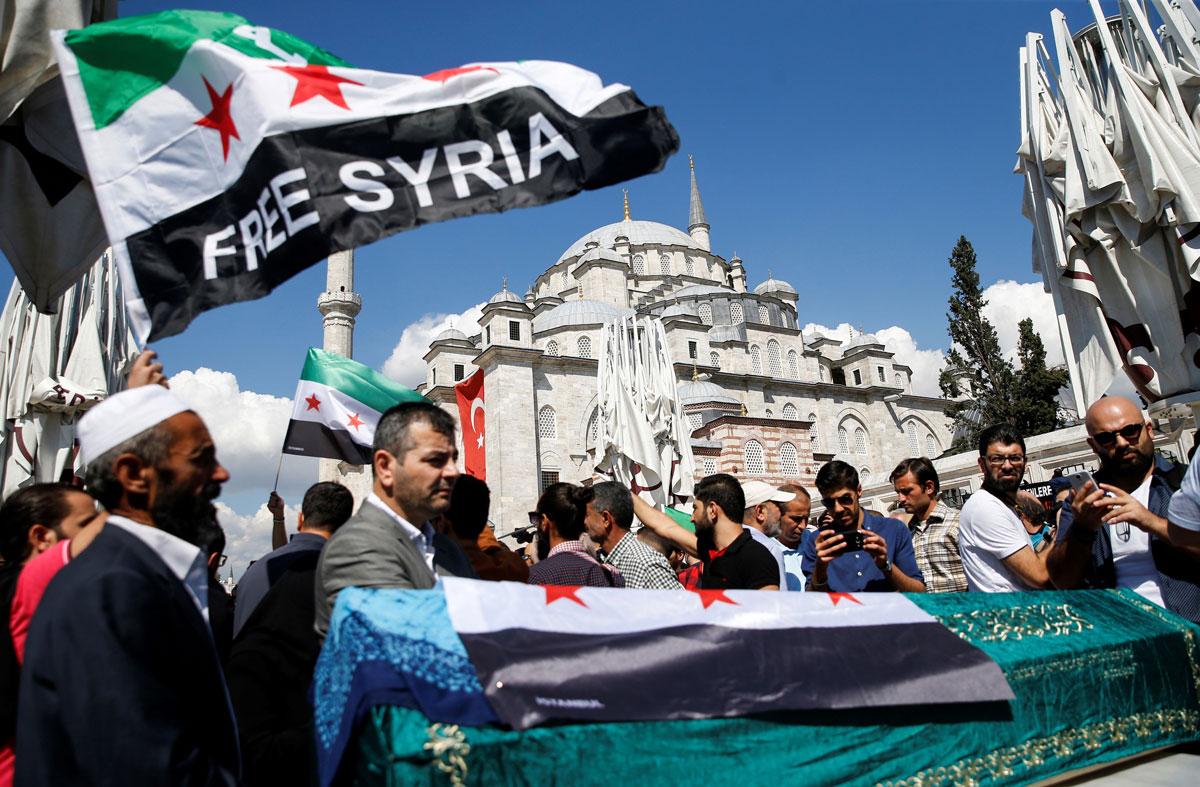
The case against Ahmed is circumstantial but significant. Ahmed, then 20, entered Turkey in early 2017. After a stint in the Free Syrian Army, he had been struggling to support himself in Damascus, Ahmed told investigators in October, and fearing he could be pressed into Assad’s service, he arranged with the Barakats to work for Orouba and eventually settled with Orouba’s younger brother Maen Barakat in Istanbul.
On Sept. 19, 2017, security camera footage obtained by investigators shows Ahmed walking away from a bus station in Istanbul’s Küçüksu neighborhood in the direction of Halla and Orouba’s apartment. The cameras capture him at multiple points along the route, and he is last seen just a few blocks away.
Security camera footage shows Ahmed again the morning after, walking away from the area of the apartment. He has changed his clothes and now appears to be carrying a plastic shopping bag. By the time he reaches the bus station, the bag has disappeared. Halla and Orouba’s bodies were discovered the following night, after friends and colleagues realized they were missing.
Ahmed’s attempts to explain his presence in the area that night strain credulity. He admits that he visited the apartment, but claims he left and spent the night sleeping near the water.
“I went to Orouba just for a visit,” Ahmed told ABC News and Reveal, echoing his denials to investigators. “I knocked on the door and no one answered, and I needed to sleep because I don’t have anyone to go to but Orouba in Istanbul.”
Material evidence of Ahmed’s presence inside the apartment, however, was contradictory. Investigators took swabs from Halla and Orouba’s bodies twice — once at the crime scene and again during the autopsy. While forensic experts who examined the crime scene swabs reported that DNA matching Ahmed’s profile was discovered under one of Orouba’s fingernails, the autopsy report concluded that there was no foreign DNA found on Orouba’s body at all.
The discrepancy does not appear to have been addressed or resolved. The case file indicates that forensic analysis of fingerprints, footprints and electronic devices taken from the crime scene were ordered, but there are no documents specifying whether those findings confirm or contradict investigators’ theory of the case.
Police later searched for Ahmed’s shopping bag, but never found it, according to a court filing. Experts examined all the knives in the apartment, but court documents indicate investigators were unable to identify the murder weapon.
The Barakat family doesn’t doubt Ahmed’s involvement, only his motive and his means to carry out the killings on his own.
“Ahmed alone cannot kill them. No way,” Maen Barakat told ABC News and Reveal. “Ahmed was an accomplice in the crime.”
Turkish investigators appear to have shared those suspicions, at least initially, and their immediate descriptions of the crime scene — corroborated by independent eyewitnesses — appear inconsistent with the prosecutor’s theory of the case as a crime of passion.
Here, again, the investigative files reveal stark contradictions that were never directly addressed by prosecutors. According to the autopsy reports, Halla and Orouba each were stabbed multiple times in their face and neck area. But chief prosecutor Tuncay Karcioglu, who personally examined the crime scene, according to the police report, was left with a different impression.
“An external wound, slaughter style, can be seen on her neck,” Karcioglu noted twice, once in reference to Halla and again in reference to Orouba.
Days later, when Shaza Barakat, Orouba’s younger sister, was preparing to wash Halla and Orouba’s bodies for burial in accordance with Muslim tradition, she made the same observation.
“Just one [wound]. On her neck,” Shaza told ABC News and Reveal. “Both of them.”
In a handwritten note scribbled on a memo justifying the decision to continue to detain Ahmed amid an ongoing investigation, the chief prosecutor also indicated that the investigation may have been broader than previously known.
“In accordance with the evidence that has been found,” the note reads, “the suspect is suspected of committing a collective crime.”
It is the only indication that investigators believed Ahmed had not acted alone. In the wake of Ahmed’s Oct. 6 confession, however, the investigation appears to end. Questions about Ahmed’s motive — and whether he had co-conspirators — were left unanswered.
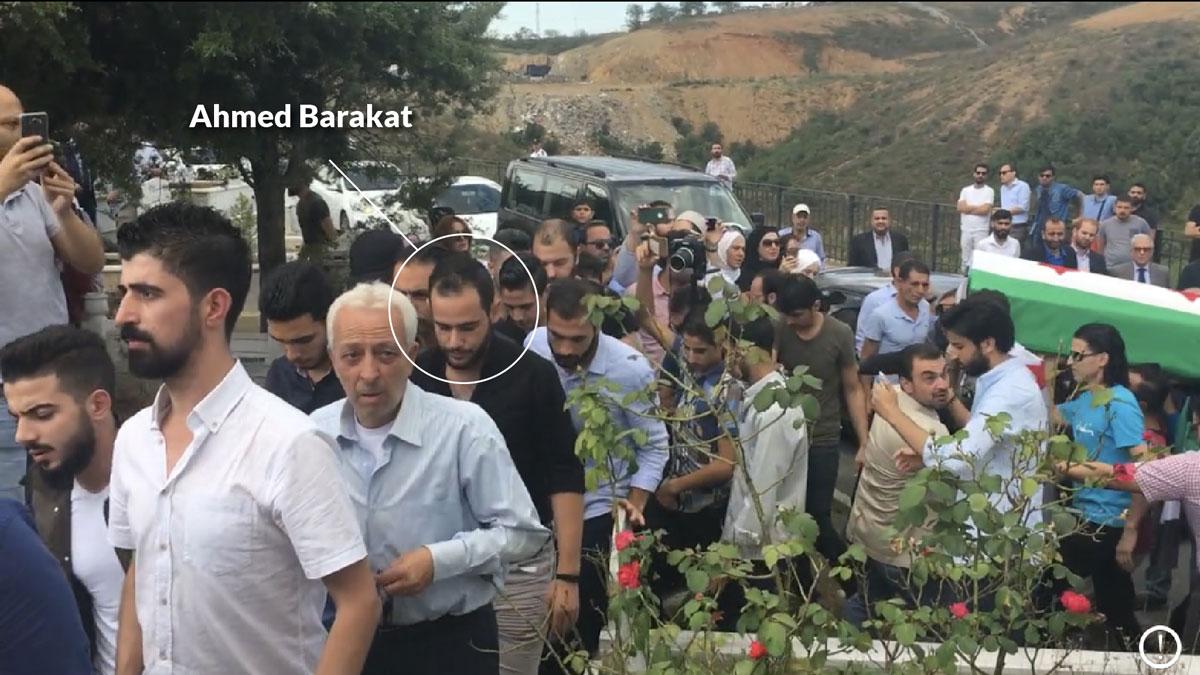
In the wake of the murders, Suzanne Barakat, 32, was determined to hold the Trump administration accountable for its response. It wasn’t the first time she would pour her grief into activism.
Suzanne’s brother Deah Barakat; his wife, Yusor Abu-Salha; and Yusor’s sister, Razan, were killed in 2015 in an infamous triple homicide in Chapel Hill, North Carolina, that authorities initially insisted was over a parking dispute. Suzanne, however, condemned the murders as a hate crime, and she has continued to speak out against the Islamophobia that she and other Muslim Americans have endured.
When her close relatives Halla and Orouba were killed, she was nearly overcome, she said, by such an “eerily similar” trauma, but she knew “it was time to use my voice.”
She emailed then-White House national security adviser Lt. Gen. H.R. McMaster, who replied with condolences and offers of assistance.
“I speak for the Administration,” McMaster wrote in an Oct. 11 email, “in saying we are deeply saddened to hear of the tragic losses your family has suffered.”
McMaster helped Suzanne secure meetings with several National Security Council officials, as well as Michael Ratney, then the top US envoy handling Syria affairs. In October 2017, she flew to Washington and — with her newborn baby in her arms — pressed top government officials at both the White House and the State Department to “find the truth” of what happened to her family.
“They assured me that they would kind of be on top of it and keep me updated,” Suzanne said. “I received those assurances.”
In November 2017, Suzanne received an email from Jennifer Davis, consul general of the US Consulate in Istanbul, which Suzanne shared with ABC News and Reveal.
“Because this case involves an active criminal investigation,” Davis said, “I would need to refer you to the FBI Agent and/or the Diplomatic Security official here at the Consulate who are working on the case.”
By December 2017, however, any investigative efforts appear to have stalled. In a letter to the Council on American-Islamic Relations, the nation’s largest Muslim civil rights group, George Piro, then assistant director of the FBI’s international operations division, wrote that while the US government “offered FBI analysis and assistance” to local authorities, the Turkish National Police “respectfully declined the FBI’s assistance as TNP is very capable of conducting a thorough and complete investigation.”
“The TNP is awaiting forensic evidence to be analyzed and currently has a suspect in custody who is strongly believed to be the perpetrator of the homicide of Halla and Orouba Barakat,” Piro wrote. “Due to jurisdictional legalities, the TNP will continue to work this matter and provide updates to our Legal Attache office in Ankara.”
A heavily redacted FBI memo dated Jan. 19, 2018, obtained by Reveal through the Freedom of Information Act, states that “there is no FBI case regarding the murder of Halla Barakat,” adding that “there is no action that ALAT (assistant legal attaché) Istanbul can take at this point. Any further action should come from FBI HQ and LEGAT (legal attaché) Ankara.”
But no one in the Trump administration informed Suzanne. She continued to push for action, unaware that the case already had been closed. When the responses to her inquiries slowed, Suzanne reached out to Rep. David Price, urging him to seek answers of his own. He requested an official briefing on the matter, and what he and his staff learned in October 2019 — from both the FBI and State Department — disappointed him.
Price said he came away from the briefing convinced that the question of US involvement was not only a legal question, but “a diplomatic matter.”
“But the diplomatic answer was not an adequate one,” he said. “It was that the diplomacy says we don’t get involved here.”
Citing the United States’ “increasingly fraught relationship” with Turkey, Price said he believes the Turks were willing to settle for Ahmed’s “implausible” confession while the US failed to insist that the case be jointly pursued.
“The larger context is troubling,” Price said. “It gives one reason to particularly question this kind of deference to Turkish authorities. Especially in a case that involves an American citizen.”
McMaster did not respond to requests for comment, and Ratney declined to comment. The State Department referred all queries to the FBI.
Suzanne also contacted Twitter, which she suspected might have information that could be useful in identifying who hacked Orouba’s account. But multiple entreaties to the social media platform — from Suzanne’s attorney, Price and ABC News and Reveal — did not produce any results.
“In order to protect the privacy of those who use our service, we’re unable to provide details on the accounts you referenced,” said Twitter spokesperson Trenton Kennedy. “However, our teams have been in contact with Congressman Price’s office regarding this issue.”
For Suzanne, it has been a long, frustrating odyssey, one that has left her questioning her own government.
“It’s hard feeling like I’m still in the dark,” Suzanne said recently. “What does this mean, as an American citizen, if I were to travel abroad and something happened to me, something happened to you?”
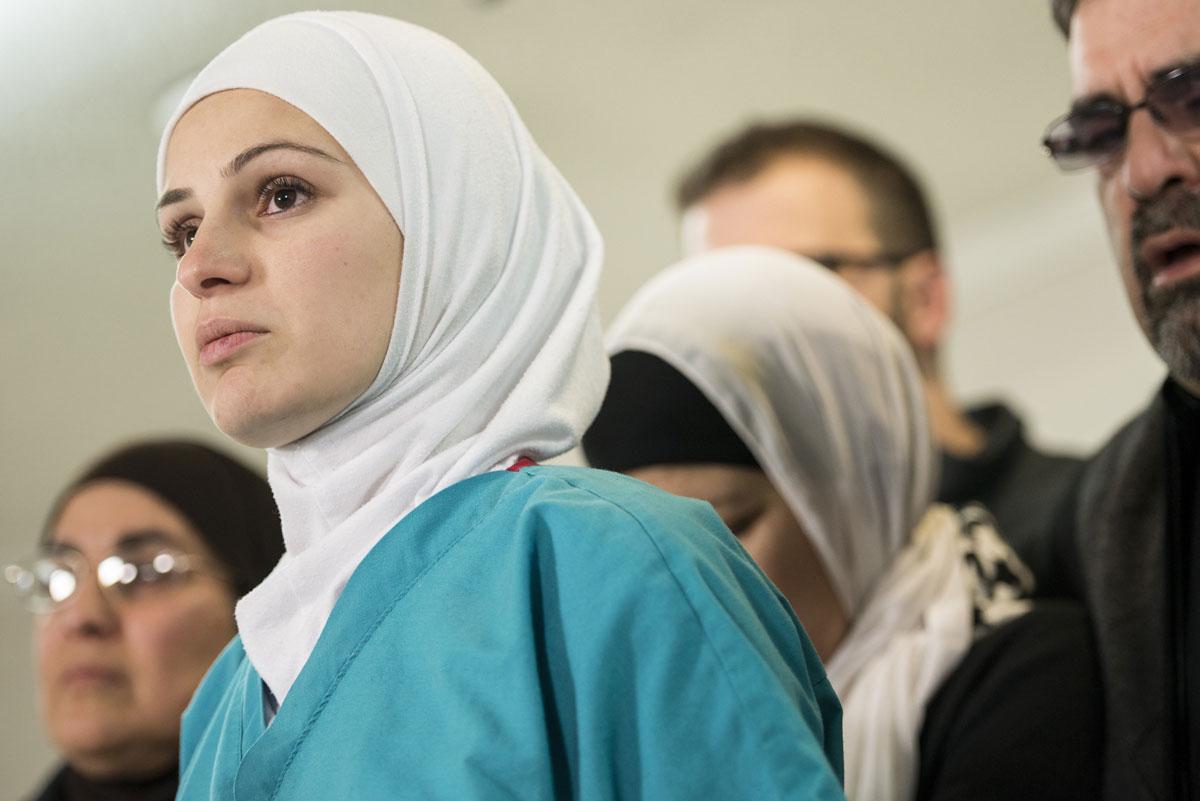
The Barakat family and their allies hope that new information could help break the legal and diplomatic logjam that appears to have left Halla and Orouba’s case in limbo.
“We all deserve the truth,” Suzanne told ABC News and Reveal. “What happened to them is so gruesome and horrific and unacceptable. … Their lives mattered. And it matters that we know what happened and why it happened and to hold those people accountable.”
The case could finally get some fresh attention. Agnes Callamard, the United Nations’ special rapporteur on extrajudicial, summary or arbitrary executions, told ABC News and Reveal this week that her office has “received information” about the murders and is “in contact with the Turkish government about these killings.” Callamard is the human rights and international law expert who determined that Saudi Arabia was responsible for the premeditated killing of Jamal Khashoggi.
“It is an important case for me,” Callamard said. “My objective is to determine whether the investigation has met the standard it should meet under international law. Was it effective? Was it impartial? Was it independent? And importantly and most specifically, in the case of a journalist, did it consider all the possible motivations behind the killings?”
Callamard said it is her responsibility to ensure that governments “do not stop at identifying the hit men, but look as well to identify those that have ordered the crime.”
“It is, in my view, absolutely crucial that as a society, we are prepared to do everything we can to go to the bottom of the killing of a journalist,” she said. “When we dig into such a crime, when we go beyond the surface of such a killing, what we find usually are deep-seated corruption, criminal activities within the core of the state, or injustice and the impunity that have become part of the system.”
“That is why investigating the killing of a journalist is very likely to have a ripple effect. Of course, it will deliver justice for that killing, but it may also deliver justice to all of us.”
Price, meanwhile, pressed for a pursuit of open leads and called on State Department officials to appeal to their Turkish counterparts to grant the authorization for “FBI work on the ground.”
“It involves our diplomacy,” Price told ABC News and Reveal. “And it involves some work with our supposed friends and allies in Turkey.”
At stake, according to Joel Simon, of the Committee to Protect Journalists, is the ability of journalists around the world to safely conduct their work.
“Murder of journalists is an ultimate act of censorship,” Simon said. “It’s important for other journalists to investigate the killings of their colleagues and help bring the perpetrators to justice in order to ensure the safety of other journalists. It’s also important to continue the work of the killed journalist, to carry on the message and say, ‘You may kill the messenger, but you won’t kill the message.’”
Some chilling words came from Halla herself. In transcripts of a 2016 interview with ABC News, Halla spoke of an American friend working in Syria who had been killed while doing dangerous work of her own.
“It was completely proven,” Halla said, “that the American citizen does not have any support by their government.”
Engin Bas, Nicky DeBlois, Jake Lefferman, Ashley Louszko, Matthew McGarry and Katie Muldowney at ABC News and Taki Telonidis at Reveal contributed to this story. Asmaa Al Omar, Beril Eski and Kerem Inal contributed reporting, research and translations. This story was edited by Esther Kaplan at Reveal and Cindy Galli at ABC News and copy edited by Nikki Frick at Reveal.
Fariba Nawa, a freelance investigative reporter in Istanbul, can be reached at fnawa@hotmail.com. ABC News investigative reporter James Gordon Meek can be reached at james.meek@abc.com. Reveal senior reporter Aaron Glantz can be reached at aglantz@revealnews.org. ABC News investigative producer Pete Madden can be reached at pete.a.madden@abc.com. Freelance producer and reporter Chris Harland-Dunaway can be reached at charlanddunaway@gmail.com. Follow them on Twitter: @faribanawa, @meekwire, @Aaron_Glantz, @pamadden and @ChrisHDeee.
